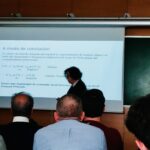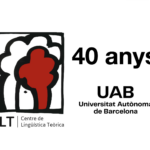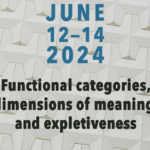4 setembre, 2023
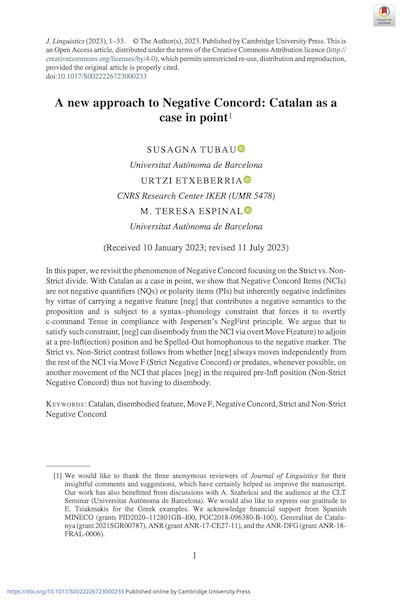
Autors:
Susagna Tubau, Urtzi Etxeberria i M.Teresa Espinal
Títol:
A new approach to Negative Concord: Catalan as a case in pointEditorial: Journal of Linguistics (Cambridge University Press)
Data de publicació: Juliol del 2023
Pàgines: 33 Més informacióIn this paper, we revisit the phenomenon of Negative Concord focusing on the Strict vs. Non-Strict divide. With Catalan as a case in point, we show that Negative Concord Items (NCIs) are not negative quantifiers (NQs) or polarity items (PIs) but inherently negative indefinites by virtue of carrying a negative feature [neg] that contributes a negative semantics to the proposition and is subject to a syntax–phonology constraint that forces it to overtly c-command Tense in compliance with Jespersen’s NegFirst principle. We argue that to satisfy such constraint, [neg] can disembody from the NCI via overt Move F(eature) to adjoin at a pre-Infl(ection) position and be Spelled-Out homophonous to the negative marker. The Strict vs. Non-Strict contrast follows from whether [neg] always moves independently from the rest of the NCI via Move F (Strict Negative Concord) or predates, whenever possible, on another movement of the NCI that places [neg] in the required pre-Infl position (Non-Strict Negative Concord) thus not having to disembody.
4 setembre, 2023
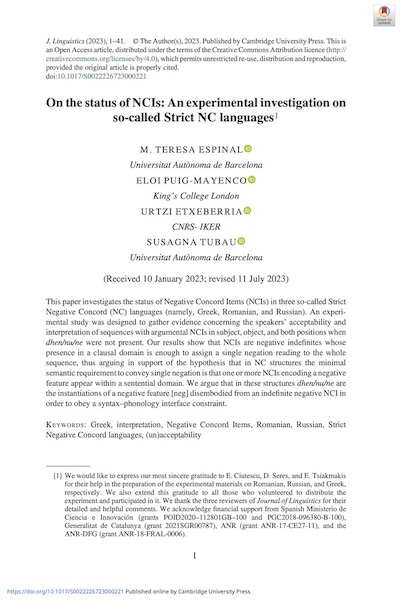
Autors:
M.Teresa Espinal, Eloi Puig-Mayenco, Urtzi Etxeberria i Susagna Tubau
Títol:
On the status of NCIs: An experimental investigation on so-called Strict NC languagesEditorial: Journal of Linguistics (Cambridge University Press)
Data de publicació: Juliol del 2023
Pàgines: 41 Més informacióThis paper investigates the status of Negative Concord Items (NCIs) in three so-called Strict Negative Concord (NC) languages (namely, Greek, Romanian, and Russian). An experimental study was designed to gather evidence concerning the speakers’ acceptability and interpretation of sequences with argumental NCIs in subject, object, and both positions when dhen/nu/ne were not present. Our results show that NCIs are negative indefinites whose presence in a clausal domain is enough to assign a single negation reading to the whole sequence, thus arguing in support of the hypothesis that in NC structures the minimal semantic requirement to convey single negation is that one or more NCIs encoding a negative feature appear within a sentential domain. We argue that in these structures dhen/nu/ne are the instantiations of a negative feature [neg] disembodied from an indefinite negative NCI in order to obey a syntax–phonology interface constraint.
14 novembre, 2023
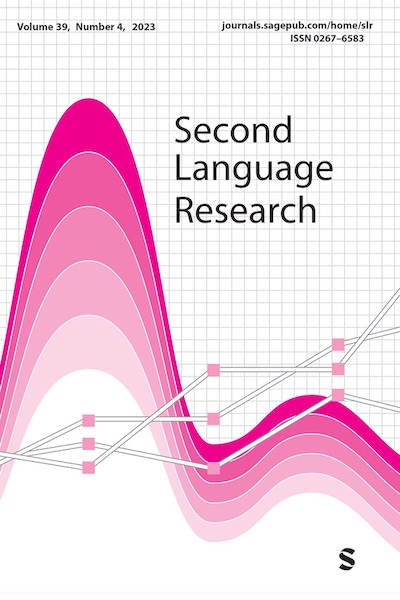
Autors:
Panagiota Margaza & Anna Gavarró
Títol:
Subject position and verb class in L2 Greek and L2 SpanishEditorial: Second Language Research (Sage Journals)
Data de publicació: 24 de maig del 2023
Més informacióGreek and Spanish are two languages that display a similar subject distribution with unergative/unaccusative verbs, but different word orders with focused subjects (SV in Greek and VS in Spanish). Here we consider subject–verb word order in second language (L2) Greek and L2 Spanish in order to test the Interface Hypothesis (IH). To this end, we report a word-order selection task, with a Greek and a Spanish version. The two versions of the task were administered to L2 intermediate and advanced learners and native speakers of Greek and Spanish. The results show that the first language (L1) Spanish learners of Greek approximated more closely native word orders than the L1 Greek learners of Spanish. For the Spanish learners of Greek, the advanced group performed at ceiling, while the intermediate group performed native-like only with unergatives in neutral and direct interrogative subject-focused contexts. On the other hand, for the Greek learners of Spanish, the intermediate group failed in all contexts, while the advanced group performed native-like with unaccusatives in neutral contexts. This asymmetry between L2 Greek and L2 Spanish reveals that the L1–L2 combination determines the learners’ performance, and this is unexpected under the IH.
18 desembre, 2023
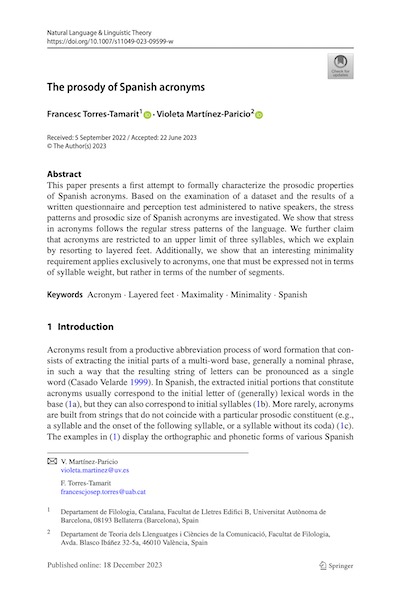
Autors:
Francesc Torres-Tamarit & Violeta Martínez-Paricio
Títol:
The prosody of Spanish acronymsEditorial: Natural Language & Linguistic Theory (Springer)
Data de publicació: 18 desembre 2023
Text completThis paper presents a first attempt to formally characterize the prosodic properties of Spanish acronyms. Based on the examination of a dataset and the results of a written questionnaire and perception test administered to native speakers, the stress patterns and prosodic size of Spanish acronyms are investigated. We show that stress in acronyms follows the regular stress patterns of the language. We further claim that acronyms are restricted to an upper limit of three syllables, which we explain by resorting to layered feet. Additionally, we show that an interesting minimality requirement applies exclusively to acronyms, one that must be expressed not in terms of syllable weight, but rather in terms of the number of segments.
6 febrer, 2024
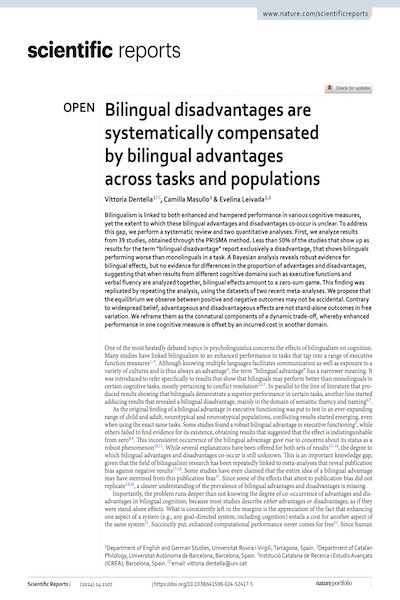
Autors:
Vittoria Dentella, Camilla Masullo & Evelina Leivada
Títol:
Bilingual disadvantages are systematically compensated by bilingual advantages across tasks and populationsEditorial: Scientific Reports (Springer Nature)
Data de publicació: 24 de gener del 2024
Text completBilingualism is linked to both enhanced and hampered performance in various cognitive measures, yet the extent to which these bilingual advantages and disadvantages co-occur is unclear. To address this gap, we perform a systematic review and two quantitative analyses. First, we analyze results from 39 studies, obtained through the PRISMA method. Less than 50% of the studies that show up as results for the term “bilingual disadvantage” report exclusively a disadvantage, that shows bilinguals performing worse than monolinguals in a task. A Bayesian analysis reveals robust evidence for bilingual effects, but no evidence for differences in the proportion of advantages and disadvantages, suggesting that when results from different cognitive domains such as executive functions and verbal fluency are analyzed together, bilingual effects amount to a zero-sum game. This finding was replicated by repeating the analysis, using the datasets of two recent meta-analyses. We propose that the equilibrium we observe between positive and negative outcomes may not be accidental. Contrary to widespread belief, advantageous and disadvantageous effects are not stand-alone outcomes in free variation. We reframe them as the connatural components of a dynamic trade-off, whereby enhanced performance in one cognitive measure is offset by an incurred cost in another domain.







